|
|
|
Sort Order |
|
|
|
Items / Page
|
|
|
|
|
|
|
| Srl | Item |
| 1 |
ID:
124480
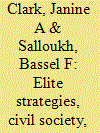

|
|
|
|
|
| Publication |
2013.
|
| Summary/Abstract |
This article explains the endurance of sectarian identities and modes of political mobilization in Lebanon after the civil war. This is done by examining three case studies that demonstrate a recursive relation between sectarian elites and civil society actors: on one side of this relation, sectarian elites pursue their political and socioeconomic interests at the expense of civil society organizations (CSOs); on the other side, civil society actors instrumentalize the sectarian political system and its resources to advance their own organizational or personal advantage. These mutually reinforcing dynamics enable sectarian elites to penetrate, besiege, or co-opt CSOs as well as to extend their clientelist networks to CSOs that should otherwise lead the effort to establish cross-sectarian ties and modes of political mobilization or that expressly seek to challenge the sectarian system. The article fills a gap in the literature on sectarianism in postwar Lebanon and helps explain a puzzle identified by Ashutosh Varshney in the theoretical debate on ethnic conflict, namely the reasons behind the "stickiness" of historically constructed ethnic identities
|
|
|
|
|
|
|
|
|
|
|
|
|
|
|
|
| 2 |
ID:
077171


|
|
|
|
|
| Publication |
2007.
|
| Summary/Abstract |
This essay engages the colonial legacy of postwar Japan by arguing that the political cartoons produced as part of the postwar Japanese labor movement's critique of U.S. cultural hegemony illustrate how gendered discourses underpinned, and sometimes undermined, the ideologies formally represented by visual artists and the organizations that funded them. A significant component of organized labor's propaganda rested on a corpus of visual media that depicted women as icons of Japanese national culture. Japan's most militant labor unions were propagating anti-imperialist discourses that invoked an engendered/endangered nation that accentuated the importance of union roles for men by subordinating, then eliminating, union roles for women
|
|
|
|
|
|
|
|
|
|
|
|
|
|
|
|
| 3 |
ID:
131335
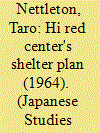

|
|
|
|
|
| Publication |
2014.
|
| Summary/Abstract |
This essay considers the relationship between the Japanese Fluxus-affiliated collective Hi Red Center's performance event Shelter Plan (1964) and Frank Lloyd Wright's Imperial Hotel, in which the event was staged. In the year of the Tokyo Olympics and the heralding of the end of the post-war era for Japan, Shelter Plan, which involved the production of tailor-made bomb shelters, rejected the ideological function of the Tokyo Olympics, and the increasingly repressive political climate that accompanied it. I argue that Shelter Plan needs to be understood as a site-specific response to one of Frank Lloyd Wright's major works. As successor to a lineage of hotels designed to house Western visitors in Japan, and imagined by Wright as an opportunity to bring the Japanese 'off their knees' and into modernity, the Imperial Hotel was a highly charged site for addressing the politics of intercultural exchange between Japan and the West.
|
|
|
|
|
|
|
|
|
|
|
|
|
|
|
|
| 4 |
ID:
078706
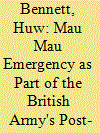

|
|
|
| 5 |
ID:
105312


|
|
|
|
|
| Publication |
2011.
|
| Summary/Abstract |
This article explores the role of Japan in post-war Asia to endeavor to present a more accurate picture than the one-dimensional portrayal of Japan as an exclusively economic presence. By taking three viewpoints into consideration, the author attempts to provide a picture of international politics in post-war Asia as an integrated whole.
|
|
|
|
|
|
|
|
|
|
|
|
|
|
|
|
| 6 |
ID:
083248


|
|
|
|
|
| Publication |
2008.
|
| Summary/Abstract |
This article provides empirical evidence on the effects of inflation on postwar capital flight flows. It tests the hypothesis that inflation has a positive differential effect on capital flight in postwar economies. It uses a new panel dataset of 77 developing countries, of which 35 experienced at least one episode of war between 1971 and 2000. The rest enjoyed peace throughout this period. Ordinary Least Squares, Generalized Least Squares, Within-Group and Arellano-Bond estimation methods are applied to four capital flight measures - Cline, World Bank, Morgan Guaranty and Dooley. The results support the research hypothesis: in postwar economies, a percentage point increase in the inflation rate is associated with a differential increase in annual capital flight flows of about 0.005 to 0.01 percentage points of GDP. This constitutes the positive differential impact of inflation on capital flight after war. This finding is robust to alternative specifications of the capital flight equation, the different measures of capital flight and econometric estimation methodologies. Given the average level of capital flight flows and the high and sustained inflation rates in some postwar economies, the overall effect could be substantial. The implication is that low inflation helps to curb capital flight in postwar economies.
|
|
|
|
|
|
|
|
|
|
|
|
|
|
|
|
| 7 |
ID:
101170


|
|
|
|
|
| Publication |
2010.
|
| Summary/Abstract |
The purpose of this article is twofold. First, we aim to evaluate the records of executive branches of the Lebanese government that are involved in public social spending in terms of their ability to respond to need. Second, we attempt to uncover the criteria underlying the distribution of public social spending. The allocation of funds across sectors and administrative districts is evaluated according to a vector of the socioeconomic characteristics of each locality thought to be of relevance. We find that the association between need and spending is, at best, very loose. When we use the geographical distribution of spending and voting data from each locality to estimate each religious sect's share of public spending, we find a striking conformity between the sectarian composition of the population and each sect's estimated share of national public spending. The logic of the disbursement of public funds and the mechanism underlying the observed one-man one-dollar distribution rule-a rule with primacy over health, education, and infrastructure needs as well as imbalances across regions-is that distribution be balanced across sects.
|
|
|
|
|
|
|
|
|
|
|
|
|
|
|
|
| 8 |
ID:
078562
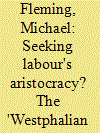

|
|
|
|
|
| Publication |
2007.
|
| Summary/Abstract |
In the immediate aftermath of World War II the Polish state placed a high value on national homogeneity. The Polish Committee of National Liberation signed population exchange agreements with its socialist neighbours in September 1944 and expelled the German population who remained within the new Polish borders. Far less frequently discussed are the Polish state's efforts to persuade 'Poles' in Western Europe to move to Poland. This paper analyses how Polish policy towards 'Westphalian Poles' and the British reaction to Polish claims offer insight into both Polish and British nationality and citizenship policy in the immediate post-war period. I argue that the quality of potential labour played an important role in both British and Polish thinking. The paper also contends that the 'Westphalian incident' gives useful insights into the emergence of the Cold War
|
|
|
|
|
|
|
|
|
|
|
|
|
|
|
|
| 9 |
ID:
128966
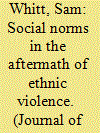

|
|
|
|
|
| Publication |
2014.
|
| Summary/Abstract |
This study considers prospects for the revitalization of social norms after ethnic violence using a behavioral experiment in postwar Bosnia. In the experiment, subjects are asked to distribute a ten-unit monetary sum between two anonymous recipients of random ethnicity. The results indicate a surprisingly high number of egalitarian distributions across ethnicity, which is interpreted as evidence of a norm of fairness. Discriminating behavior in the experiment is explained as a product of ethnic parochialism (rewarding co-ethnics and punishing non-co-ethnics). Overall, the experiment speaks to the resiliency of an important aspect of pro-social behavior after violence-impartiality in the treatment of others.
|
|
|
|
|
|
|
|
|
|
|
|
|
|
|
|
| 10 |
ID:
108811


|
|
|
|
|
| Publication |
2011.
|
| Summary/Abstract |
A public discourse of "youth crisis" emerged in 1930s Egypt, partly as a response to the widespread student demonstrations of 1935 and 1936 that ushered in the figure of youth as an insurgent subject of politics. The fear of youth as unbridled political and sexual subjects foreshadowed the emergence of a discourse of adolescent psychology. By the mid-1940s, "adolescence" had been transformed into a discrete category of analysis within the newly consolidated disciplinary space of psychology and was reconfigured as a psychological stage of social adjustment, sexual repression, and existential anomie. Adolescence-perceived as both a collective temporality and a depoliticized individual interiority-became a volatile stage linked to a psychoanalytic notion of sexuality as libidinal raw energy, displacing other collective temporalities and geographies. New discursive formations, for example, of a psychology centered on unconscious sexual impulses and a cavernous interiority, and new social types, such as the "juvenile delinquent," coalesced around the figure of adolescence in postwar Egypt.
|
|
|
|
|
|
|
|
|
|
|
|
|
|
|
|
| 11 |
ID:
092630


|
|
|
|
|
| Publication |
2009.
|
| Summary/Abstract |
For more than three years, Lebanon has been beset by a succession of political assassinations and disquieting public protests. Little is known about the views of the youth, roughly half the country's population, who have witnessed the enthusiasm and sense of national consciousness sparked by the Cedar Revolution of 2005. This article focuses on the narrative texts of returnee students at the American University of Beirut, exploring their hopes and disappointments. Such trenchant voices should be incorporated into the shaping of the public discourse and reconciliation currently underway.
|
|
|
|
|
|
|
|
|
|
|
|
|
|
|
|
|
|
|
|
|